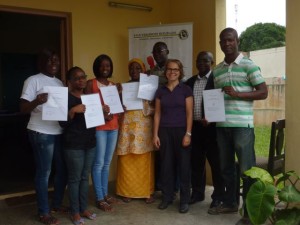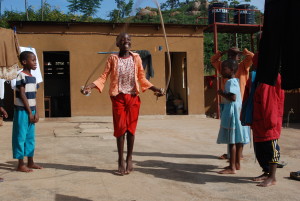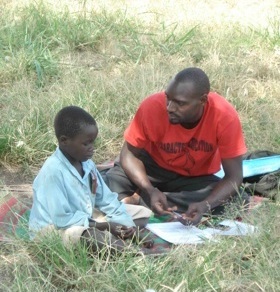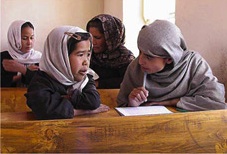vivo counsellors have been providing trauma-therapy in war-affected communities of Northern Uganda since 2007 mostly for severely traumatised formerly abducted children now grown into young adults with their own families. For a long time vivo counsellors had realised the vast need for also an alcohol intervention, when meeting women and children affected by domestic violence that is often linked to male alcohol consumption.

family violence
Es werden alle Berichte über Projekte angezeigt, die sich mit familiärer Gewalt beschäftigen.All project reports on family violence are displayed.
Setting a sign against alcohol abuse
vivo counsellors have been providing trauma-therapy in war-affected communities of Northern Uganda since 2007 mostly for severely traumatised formerly abducted children now grown into young adults with their own families. For a long time vivo counsellors had realised the vast need for also an alcohol intervention, when meeting women and children affected by domestic violence that is often linked to male alcohol consumption.

Kids grow up
A successful project ends
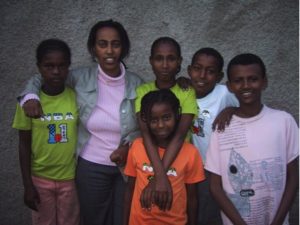
After a project in 2006, vivo founded a small orphanage in Ethiopia. The children have now become independent young adults and vivo was able to successfully complete the project in 2020.
A successful project ends

After a project in 2006, vivo founded a small orphanage in Ethiopia. The children have now become independent young adults and vivo was able to successfully complete the project in 2020.
Support for students in uncertain times
vivo supports a school counselor`s project in Tanzania for many years. After the closing due to the COVID-19 pandemic, the schools are now opening again.
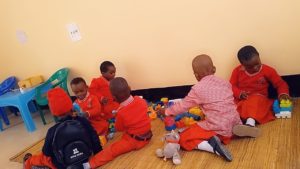
Lesen Sie weiter: Support for students in uncertain times
vivo supports a school counselor`s project in Tanzania for many years. After the closing due to the COVID-19 pandemic, the schools are now opening again.

Continue reading: Support for students in uncertain times
News from Gulu
New therapists for Uganda and supoort from Germany
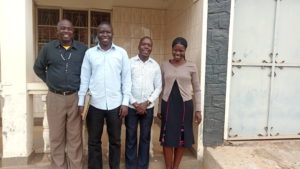
In February 2020 the vivo outpatient clinic in Gulu, Northern Uganda planned to recruit four new staff members. Therefore we trained eight candidates in the theoretical background and practical application of Narrative Exposure Therapy (NET). The training was supported by vivo member Dr. Ulrike Amann on her fourth yearly volunteer work-visit to the Gulu outpatient clinic.
New therapists for Uganda and supoort from Germany

In February 2020 the vivo outpatient clinic in Gulu, Northern Uganda planned to recruit four new staff members. Therefore we trained eight candidates in the theoretical background and practical application of Narrative Exposure Therapy (NET). The training was supported by vivo member Dr. Ulrike Amann on her fourth yearly volunteer work-visit to the Gulu outpatient clinic.
News from Gulu
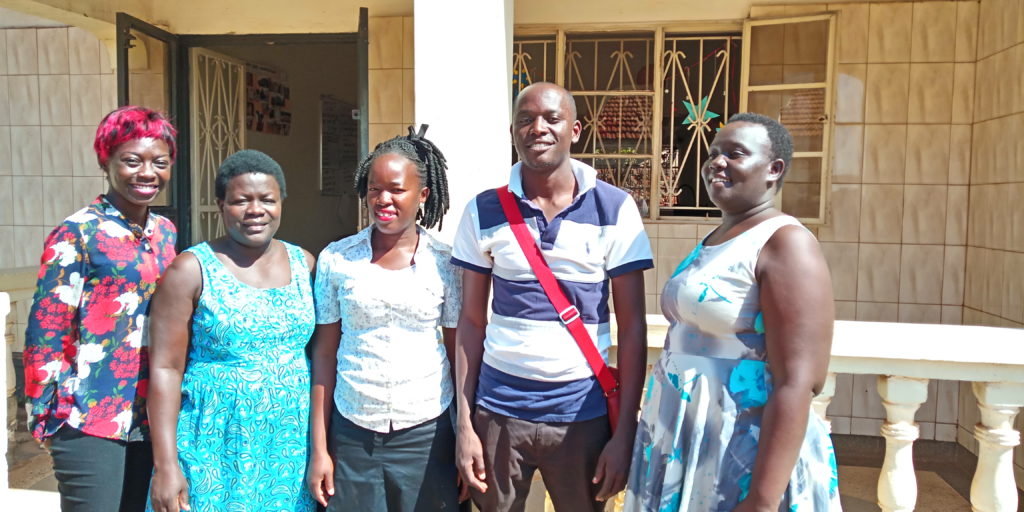
Training of new counsellors in January and February 2019 completed
Our 6 newly employed counsellors are joining our existing team of 15 senior counsellors. They are all lay personnel, having work experience and education only in non-psychological fields – but all completed successfully an intense practical and theoretical training and were chosen among 10 trainees and originally 40 applicants in total. Currently they are joining the senior counsellors in their treatment sessions in order to have a more intense on-the-job learning period before they will soon start their own treatments with highly traumatised clients by war, forceful abductions and torture.

Training of new counsellors in January and February 2019 completed
Our 6 newly employed counsellors are joining our existing team of 15 senior counsellors. They are all lay personnel, having work experience and education only in non-psychological fields – but all completed successfully an intense practical and theoretical training and were chosen among 10 trainees and originally 40 applicants in total. Currently they are joining the senior counsellors in their treatment sessions in order to have a more intense on-the-job learning period before they will soon start their own treatments with highly traumatised clients by war, forceful abductions and torture.
Improving care in orphanages
Hecker, T., Hermenau, K. (2018).
Improving Care Quality and Preventing Maltreatment in Institutional Care in Sub-Saharan Africa.
ISTSS Stress Points.
Hecker, T., Hermenau, K. (2018).
Improving Care Quality and Preventing Maltreatment in Institutional Care in Sub-Saharan Africa.
ISTSS Stress Points.
Impressions from vivo’s outpatient clinic in Northern Uganda
In 2017 the vivo outpatient clinic in Gulu, Northern Uganda, is still successful and impressing us with their work.
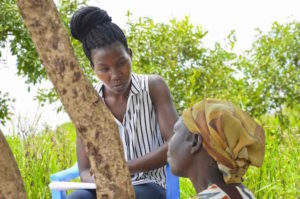
Lesen Sie weiter: Impressions from vivo’s outpatient clinic in Northern Uganda
In 2017 the vivo outpatient clinic in Gulu, Northern Uganda, is still successful and impressing us with their work.

Continue reading: Impressions from vivo’s outpatient clinic in Northern Uganda
Support for the school counsellor
Since 2012 vivo international supports the position of the school counsellor at a primary school with many orphans in Iringa. In order to support the school counsellor Hilder additionally and provide her with new materials, vivo (in cooperation with the primary school) found an intern for Hilder. The psychology student Sophia Backhaus, who already had some experience in school counselling, traveled to Tanzania to support Hilder in her work.
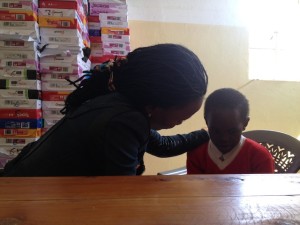
Since 2012 vivo international supports the position of the school counsellor at a primary school with many orphans in Iringa. In order to support the school counsellor Hilder additionally and provide her with new materials, vivo (in cooperation with the primary school) found an intern for Hilder. The psychology student Sophia Backhaus, who already had some experience in school counselling, traveled to Tanzania to support Hilder in her work.

Family violence and trauma
Catani, C., Sossalla, I. (2015).
Child abuse predicts adult PTSD symptoms among individuals diagnosed with intellectual disabilities.
Frontiers in Psychology, 6:1600.
Crombach, A., Bambonyé, M. (2015).
Intergenerational violence in Burundi: Experienced childhood maltreatment increases the risk of abusive child rearing and intimate partner violence.
European Journal of Psychotraumatology, 6:26995.
Saile, R., Ertl, V., Neuner, F., Catani, C. (2015).
Children of the postwar years: A two-generational multilevel risk assessment of child psychopathology in northern Uganda.
Development and Psychopathology.
Sriskandarajah, V., Neuner, F., Catani, C. (2015).
Predictors of Violence Against Children in Tamil Families in Northern Sri Lanka.
Social Science and Medicine, 146:257-265.
Catani, C., Sossalla, I. (2015).
Child abuse predicts adult PTSD symptoms among individuals diagnosed with intellectual disabilities.
Frontiers in Psychology, 6:1600.
Crombach, A., Bambonyé, M. (2015).
Intergenerational violence in Burundi: Experienced childhood maltreatment increases the risk of abusive child rearing and intimate partner violence.
European Journal of Psychotraumatology, 6:26995.
Saile, R., Ertl, V., Neuner, F., Catani, C. (2015).
Children of the postwar years: A two-generational multilevel risk assessment of child psychopathology in northern Uganda.
Development and Psychopathology.
Sriskandarajah, V., Neuner, F., Catani, C. (2015).
Predictors of Violence Against Children in Tamil Families in Northern Sri Lanka.
Social Science and Medicine, 146:257-265.
Interventions focusing on caregiving
Hermenau, K., Kaltenbach, E., Mkinga, G., & Hecker, T. (2015).
Improving care quality and preventing maltreatment in institutional care – a feasibility study with caregivers.
Frontiers in Psychology, 6, 937.
Wieling, E., Mehus, C., Möllerherm, J., Neuner, F., Laura, A., Catani, C.(2015).
Assessing the Feasibility of Providing a Parenting Intervention for War-Affected Families in Northern Uganda.
Fam Community Health, 38(3), pp. 253–268.
Hermenau, K., Kaltenbach, E., Mkinga, G., & Hecker, T. (2015).
Improving care quality and preventing maltreatment in institutional care – a feasibility study with caregivers.
Frontiers in Psychology, 6, 937.
Wieling, E., Mehus, C., Möllerherm, J., Neuner, F., Laura, A., Catani, C.(2015).
Assessing the Feasibility of Providing a Parenting Intervention for War-Affected Families in Northern Uganda.
Fam Community Health, 38(3), pp. 253–268.
vivo starts in the Republic of Côte d’Ivoire
In 2015 vivo international started working in Côte d’Ivoire. After years of heavy political crisis most people in the country enjoy once more a relatively calm life. But – as in so many countries around the globe – sexual violence against children and women continues to be rampant. The NGO SOS Violence Sexuelle supports victims of this violence in one of Abidjan’s most diadvantaged districts. vivo international has greatly enhanced the expertise of SOS’s highly motivated employees by conducting a training for several weeks.
Lesen Sie weiter: vivo starts in the Republic of Côte d’Ivoire
In 2015 vivo international started working in Côte d’Ivoire. After years of heavy political crisis most people in the country enjoy once more a relatively calm life. But – as in so many countries around the globe – sexual violence against children and women continues to be rampant. The NGO SOS Violence Sexuelle supports victims of this violence in one of Abidjan’s most diadvantaged districts. vivo international has greatly enhanced the expertise of SOS’s highly motivated employees by conducting a training for several weeks.
Continue reading: vivo starts in the Republic of Côte d’Ivoire
A new school counsellor
After two years of excellent work our school psychologist Getrude left us for further studies. Her work at the school strenghtened her interest in the work with children and she wants to deepen this interest in master studies. But before she departed, she supported her replacement with her start at the school. The psychological work is going to be continued by Hilder Humphrey, who studied counseling psychology.Sadly, we say good-bye to Getrude and happily, we welcome Hilder!
After two years of excellent work our school psychologist Getrude left us for further studies. Her work at the school strenghtened her interest in the work with children and she wants to deepen this interest in master studies. But before she departed, she supported her replacement with her start at the school. The psychological work is going to be continued by Hilder Humphrey, who studied counseling psychology.Sadly, we say good-bye to Getrude and happily, we welcome Hilder!
Preventing harmful punishment in the upbringing of children
In Tanzania corporal punishment and other forms of harmful punishment are very common and still lawful both in the family and at school. A representative national survey has shown that three quarters of Tanzanian adolescent have experienced physical violence and one quarter have experience emotional abuse during their upbringing. vivo international has found similar results in a cross-sectional study of more than 400 Tanzanian primary school students. Furthermore, we found that family violence, emotional neglect, and corporal punishment at school affected the psychological well-being of these children severely. Furthermore, school achievement and cognitive abilities were negatively influenced by harmful punishment.
Lesen Sie weiter: Preventing harmful punishment in the upbringing of children
In Tanzania corporal punishment and other forms of harmful punishment are very common and still lawful both in the family and at school. A representative national survey has shown that three quarters of Tanzanian adolescent have experienced physical violence and one quarter have experience emotional abuse during their upbringing. vivo international has found similar results in a cross-sectional study of more than 400 Tanzanian primary school students. Furthermore, we found that family violence, emotional neglect, and corporal punishment at school affected the psychological well-being of these children severely. Furthermore, school achievement and cognitive abilities were negatively influenced by harmful punishment.
Continue reading: Preventing harmful punishment in the upbringing of children
Establishment of a trauma-focused outpatient clinic for Northern Uganda
Since 1986 there has been an unrelenting and brutal war in the Northern districts of Uganda, led by the rebel group called the “Lord’s Resistance Army”. Studies by vivo have repeatedly shown that the psychological consequences of these two decades of war and terror are still ongoing: Despite the fact that the fighting ended in 2005, many survivors cannot forget their experiences and continuously relive them in the form of intruding memories, nightmares and flashbacks. For them, the war continues in their minds. Furthermore, this long-lasting war has shattered social norms of non-violent interactions, which manifests in severe cases of violence within families and communities and thus leads to further traumatization.
Lesen Sie weiter: Establishment of a trauma-focused outpatient clinic for Northern Uganda
Since 1986 there has been an unrelenting and brutal war in the Northern districts of Uganda, led by the rebel group called the “Lord’s Resistance Army”. Studies by vivo have repeatedly shown that the psychological consequences of these two decades of war and terror are still ongoing: Despite the fact that the fighting ended in 2005, many survivors cannot forget their experiences and continuously relive them in the form of intruding memories, nightmares and flashbacks. For them, the war continues in their minds. Furthermore, this long-lasting war has shattered social norms of non-violent interactions, which manifests in severe cases of violence within families and communities and thus leads to further traumatization.
Continue reading: Establishment of a trauma-focused outpatient clinic for Northern Uganda
Housing project for HIV/AIDS orphans in Ethiopia
Ethiopia is one of the poorest countries of the world. Already in 2004 it was home to 3.9 Million orphans. While many organizations are providing food, clothes and schooling for these children, vivo’s focus is on the psychosocial needs of these children to ensure their healthy mental development. Back in spring 2006 vivo interviewed more than 100 children orphaned due to HIV/AIDS living in Awassa, in Southern Ethiopia. Beside symptoms of grief, many children living in so-called foster families were suffering from ongoing maltreatment and were exploited by their foster families as servants. Therefore additionally to the implementation of trauma and grief counselling structures for orphans, vivo also engaged in awareness raising activities against child abuse and maltreatment in the community and provided training for local counsellors, grandparents and foster families on ‘positive parenting’.
Lesen Sie weiter: Housing project for HIV/AIDS orphans in Ethiopia
Ethiopia is one of the poorest countries of the world. Already in 2004 it was home to 3.9 Million orphans. While many organizations are providing food, clothes and schooling for these children, vivo’s focus is on the psychosocial needs of these children to ensure their healthy mental development. Back in spring 2006 vivo interviewed more than 100 children orphaned due to HIV/AIDS living in Awassa, in Southern Ethiopia. Beside symptoms of grief, many children living in so-called foster families were suffering from ongoing maltreatment and were exploited by their foster families as servants. Therefore additionally to the implementation of trauma and grief counselling structures for orphans, vivo also engaged in awareness raising activities against child abuse and maltreatment in the community and provided training for local counsellors, grandparents and foster families on ‘positive parenting’.
Continue reading: Housing project for HIV/AIDS orphans in Ethiopia
Violence in the family: Support for affected families in Northern Uganda
Beyond the grievous consequences of war for the individual, exposure to violence on a societal level profoundly disrupts the family system. Loss of family members, psychological suffering of individual family members, high rates of alcohol abuse and the detachment from traditional social support systems such as the extended family adversely affect family relationships. As a consequence families that
have been living through war are at a high risk for family violence even after the war has ended. Children growing up with violence in the family continue to suffer and are vulnerable to develop long-lasting emotional and behavioural problems.
Lesen Sie weiter: Violence in the family: Support for affected families in Northern Uganda
Beyond the grievous consequences of war for the individual, exposure to violence on a societal level profoundly disrupts the family system. Loss of family members, psychological suffering of individual family members, high rates of alcohol abuse and the detachment from traditional social support systems such as the extended family adversely affect family relationships. As a consequence families that
have been living through war are at a high risk for family violence even after the war has ended. Children growing up with violence in the family continue to suffer and are vulnerable to develop long-lasting emotional and behavioural problems.
Continue reading: Violence in the family: Support for affected families in Northern Uganda
Mental health survey among children in Kabul
In February 2005 vivo had trained a group of 32 local counsellors in the concepts of Traumatic Stress, PTSD and Narrative Exposure Therapy for traumatized survivors of the war and Taliban regime in Afghanistan. In October, a vivo team came back to Kabul and, together with the previously trained counsellors, carried out an epidemiological survey in schools in Dachti Barchi area of Afghanistan’s capital.
Lesen Sie weiter: Mental health survey among children in Kabul
In February 2005 vivo had trained a group of 32 local counsellors in the concepts of Traumatic Stress, PTSD and Narrative Exposure Therapy for traumatized survivors of the war and Taliban regime in Afghanistan. In October, a vivo team came back to Kabul and, together with the previously trained counsellors, carried out an epidemiological survey in schools in Dachti Barchi area of Afghanistan’s capital.
Continue reading: Mental health survey among children in Kabul


